- Home
- Matthew Pearl
The Poe Shadow Page 17
The Poe Shadow Read online
Page 17
At Glen Eliza, we had difficulties with the domestics I had hired upon my return from Paris. No doubt, our peculiar practice of sending letters from the parlor to the library made extra work for them, though this was not the only source for discontent. Many of my servants immediately rebelled against Duponte. One colored girl, in particular, a free Negress named Daphne, occasionally refused to wait on him. When I asked Daphne for the reason, she said that she thought the houseguest most cruel. Had he ever abused her? Scolded her for a mistake, perhaps? No. He had hardly addressed her at all, and when he did he was very polite. Something was not right, she said, nonetheless. “He is cruel. I can see it.”
In between household duties, I called on Hattie’s house more than once without success. Peter’s pessimistic remarks about rectifying that situation had rendered me quite anxious. Her mother, who had always been of delicate health and in her bed when not away recuperating in the country or at a spring, had been further debilitated over the summer. After a stay by the seaside, she was now largely confined, which meant more duties for Hattie. It also gave Auntie Blum fuller swing over the household. Each time I called, a servant would inform me that neither Miss Hattie nor Auntie Blum was present. Finally, I was able to speak with Hattie one day as she was ascending a carriage outside her house.
“Dear Hattie, have you not received my notes?”
Hattie glanced around and spoke stealthily, leading me away from the gates. “You must not be here, Quentin. Things are quite different here, now that Mother has been worse. I am needed by my sisters, my aunt.”
“I understand,” I said, fearing that my endeavors had only added to the strain that had fallen on poor Hattie’s shoulders. “Of our plans…I need only a bit more time…”
She shook her head, silencing me. “Things are different,” she repeated. “We cannot speak about it now, but we will. I will find you when I can, dear Quentin—I promise. Do not speak to my aunt. Wait for me to find you.”
Noises came from the house. Hattie directed me to return to the street and make a hasty exit. I did so. I could hear Auntie Blum (and could almost hear the wide bird feathers I pictured in her hat ruffling, too) ask in her big tones, “Who was that, dear girl?” I kept my back to them and quickened my stride, having the distinct feeling that if I turned to look back, the older woman inside the carriage might direct her driver to flatten me.
At Glen Eliza, the portraitist, Von Dantker, sat across from Duponte with his array of canvas and brushes spread on a table. Duponte remained giddy about the prospect of this artistic creation. The hotly temperamental Von Dantker sternly admonished Duponte to remain still, and so only the analyst’s mouth moved when we conversed. When I commented that this was not a very polite manner of holding a conversation, Duponte claimed he was all attention and that he wished to see if he could divide his mind into compartments of concentration. At times it was like speaking to a living portrait.
“What would you say truth is for the Baron, Monsieur Clark?” Duponte asked pointedly one evening.
“How do you mean?” I asked.
“You asked him whether he seeks the truth. Surely truth is not the same for everyone, as most people think they have it, or desire to have it, and yet there are still wars, and there are professors who daily overthrow each other’s hypotheses. So what is it for him, for our friend the Baron?”
I considered this. “He is a lawyer. I suppose in law, truth is a practical matter, thus one finds the practice of indiscriminate advocacy on either side in which one is retained.”
“Agreed. If Jesus Christ had kept a lawyer by his side, Pontius Pilate might have been swayed that his judgment could be reversed for defect of form and so settled on a lighter sentence, and the restoration of the human race would have been interrupted. Very well. Then if it is in the language of the law that Baron Dupin speaks, truth is not that which is likely to have happened, but that for which he can present proof as likely having happened. These are not the same. In fact they are hardly related and should never be introduced to one another.”
“How should we know if the Baron is inventing his proof in relation to Poe’s death?”
“He might try to manufacture it, indeed, but likely with some small basis in reality. If he intends to publish a popular account of his dealings on the matter of Poe’s death, as suggested, and intends to gain by lecturing on the subject, he cannot afford to be so easily discredited by using lies out of whole cloth, Monsieur Clark. After all, we saw from the Parisian newspapers that he wished his creditors to know his plans to return with enough financial resources to free himself from their attention. He is relying on this to protect him from their plots against him. He shall require facts—even if he compels some portion of them into existence.”
Duponte continued to remain on the grounds of Glen Eliza most of the time, often engaged in disagreements with Von Dantker over whether he remained sufficiently still. Duponte displayed for the artist the strangest sort of half smile, with points sharp as knives carved out at the corners of the mouth.
Sometimes I excused myself from the house on an errand; these excursions were most of all sacrificial offerings to my nerves. Earlier that year, the post office had begun delivering the mail, for an extra fee of two cents, and so I had no need to call at its offices. I described the operation of our postal services to Duponte and for a few moments he seemed acutely interested in the topic, before quickly settling back into his air of distraction. I always looked first at the mail for something unexpected: perhaps, even, a last letter written to me by Poe, if it had been misplaced or lost, and now recovered. Duponte did not receive any letters.
But one morning of note, as I started out, a messenger delivered a trunk. It had the same shape and color as one of the trunks Duponte had brought from Paris. This surprised me, for I had believed Duponte’s baggage all at my house. But he seemed to expect the object’s arrival and waved his acceptance to me.
I explored the newspapers myself each morning before adding them to Duponte’s collection. Despite all the sudden attention to Poe’s death, there was nothing like any real scrutiny in the newspapers, only rumors and anecdotes. In one, there was a new explanation about the loose-fitting and ragged clothes in which Poe had been discovered.
“This newspaper says that it has been suggested to the editor—by Baron Dupin, I have no doubt—that Poe’s clothing, which were not his own, had constituted some sort of a disguise!”
“Of course, monsieur,” said Duponte, using his eyeglass but hardly reading the article.
I was startled. “You have already thought that?”
“No.”
“Then how is it you respond to me by saying, ‘Of course’?”
“I mean to say, ‘Of course the paper is quite mistaken.’”
“But how do you know that?” I asked.
“Newspapers are almost always quite mistaken about everything,” he said. “If you should find one of the tenets of your religion in type on the sheet, it is likely time to reconsider your form of God-worship.”
“But, monsieur! You have spent the better part of every day reading the newspapers at my library table! Why waste all that time?”
“You must notice their errors, Monsieur Clark, in order to advance to the truth.”
I stared at him until he continued.
He arched his eyebrows in a particularly French fashion. “A demonstration. Take this matter of Monsieur Poe’s garments that your paper mentions. The Richmond Observer has lately written that Poe had, some days before his arrival in Baltimore, inadvertently switched his own walking stick with the Malacca cane of a friend in Richmond, one Dr. John Carter. In the same paper we read—in a burlesque error somewhat different from the equally erroneous disguise camp—that Poe’s clothes were stolen and had been replaced in a robbery during his time in Baltimore. To place the garments in the central position of importance, because they are easily visible to those who found Poe, is to subdue reason to fancy.”
�
��How do you know, without further information, that the clothes were not stolen in this way?”
“Have you ever heard of a thief stealing one’s clothes—rare enough—and then replacing the clothes of a victim with other dress? An idea only someone who is not a thief could devise. The editors have merely taken the most common scenario against a visitor, a robbery, and altered it to match the end results without regard to likelihood. At all events, the special quality of the borrowed cane alone tells us it is most unlikely.”
In the newspaper article to which Duponte had referred, the Observer reported that Poe had visited Dr. Carter and, after playing with the latter’s new Malacca cane, took it with him by accident. Carter also speaks of the fact that Poe left an 1819 volume of Thomas Moore’s Melodies in his office. “But this says nothing more in detail about the cane than that it is ‘Malacca.’ How, from that, do you determine that it has any special quality?”
Duponte had already moved on to a new topic. “Would you,” Duponte said, “bring me the trunk that arrived just this morning?”
I was perplexed, and a bit irritated, that this request would interrupt our discourse, particularly since I had already stored the trunk in Duponte’s chambers. I went upstairs and then wheeled the trunk from there down into the library where we sat. Duponte instructed me to open the lid. I did. My eyes widened at what I saw.
I bent down and reached in with reverence. It contained one object lying at the bottom of the trunk. “Is this…?”
“Poe’s cane. Yes.”
I picked it up cautiously in both hands and said, with wholly renewed wonder at my guest, “Duponte, how in the world—? How has Poe’s cane come to appear in your trunk?!”
Duponte explained. “Not the actual one carried by Poe at the time of his death, but the very same kind, we can be sure. That the cane Poe borrowed was identified as ‘Malacca,’ as you have just read, revealed quite more than its wood. I guessed that a finite number of canes were sold in America from that specific palm, which grows on the coasts of the Malay Peninsula, out of the beaten track. On my walk the other day, you will remember I said I stopped at some stores. I found from speaking with sellers of walking sticks that my guess was correct: there were but four or five chief selections of canes available made from Malacca in Baltimore, and likely in Richmond, as well. I purchased one of each. Then I emptied one of my trunks and sent the canes with a messenger to the Washington College Hospital, where Poe died, along with a note to Dr. Moran, the physician who attended to Poe. It explained that a shipment to Richmond had been mixed up with other canes, and kindly requested him to identify the one cane that had been held by Poe and return it here.”
“But how did you know Dr. Moran would have sent such a shipment to Carter?”
“Oh, I did not suppose he had, which is why he would not have found my request odd. More likely, Dr. Moran sent all the effects to one of Poe’s family members—possibly your acquaintance Neilson. He, in turn, would have attempted to return articles to their respective owners. As gratitude for the favor, my note to Dr. Moran made a gift of the other three Malacca canes I sent him. As I hoped, Moran has sent me one back. Do you find anything special about the cane, Monsieur Clark?”
“If Poe were assaulted in a robbery,” I said, realizing its significance, “the thieves would surely have taken a stick this fine!”
“You have come closer to the truth by finding what is false.” Duponte nodded approvingly. “And now this cane is yours.”
My next errand in the city—to where, I cannot now remember—was also a good excuse to make use of my new walking stick. It was a very handsome ornament. It even inspired me to lend more attention to my dress, and I employed the deliberation of a statesman in selecting a hat and a vest that complimented the new accessory. Several representatives of the kinder sex, both younger ladies and those who watch after them, looked upon me with visible approval as I went through Old Town.
Oh yes, the errand—it was to two dronish men who had left word for me to call on them about various investments I held through my father’s will. With a delay in the planned expansion of the Baltimore & Ohio Railroad to the Ohio River, various interests were affected, and they passed on to me a thick portfolio of papers that required my review. Naturally, I’d had little time during all else that was happening to peruse these papers very meticulously.
I found myself that afternoon again in the neighborhood where Poe was discovered on the third of October 1849. I decided to walk to the establishment, Ryan’s hotel, where Poe had turned up in poor condition. I thought about what might have been done or said at that time—to save Poe, or at least to reassure him—in those crucial moments now two years ago.
My melancholy reverie was interrupted with shouting from around the corner. There was nothing of much consequence about stray noise in the streets of a city like Baltimore, where rattling fire engines and hollering continued through the nights and sometimes erupted into riots between rival fire companies or against groups of foreigners. But this lone scream, crackling like the death aria in an opera, sent chills straight through me.
“Reynolds…!”
“Reynolds!”
It was the word Poe had cried out in the hospital as he died.
Now, remember where this cry found me. Standing before the spot where Poe was removed to his hospital deathbed. Think of my disorientation, as though I had suddenly been lifted into someone else’s life—someone else’s death.
I crept forward. It rang out once more!
I turned onto the next street and stepped into the shadows of a narrow passage between two buildings, closing in on the sounds. A short man wearing spectacles and a morning coat walked right by, sending me jumping back, and now I recognized the voice of the man chasing him.
“Why, Mr. Reynolds!” the pursuer boomed out.
“Leave me be, won’t you,” replied the man—well, now we are free to say replied Reynolds.
“Good sir,” protested the Baron Dupin, “I must remind you that I am a special constable.”
“Special constable?” Reynolds repeated doubtfully.
“For the British crown itself,” the Baron said patriotically.
“British crown!” Reynolds exclaimed. “Why would it harass me? To hell with their crown then!”
“Is deep concern a sort of harassment? One is the very opposite of the other. I wish only to know the full story, for your protection.” The Baron Dupin grinned. He spoke in his usual dashing fashion; he was not in his shaggy disguise this time.
“But I haven’t a story to tell anyone!”
“You don’t realize you have one yet. My dear Reynolds, there are parties who are quite interested in how events came off that day, as you have seen lately in the newspapers. Your public reputation, your livelihood as a carpenter, your family’s good name could be in jeopardy if the truth is not sufficiently extracted first. You were there that day at Ryan’s. You saw—”
“I saw nothing,” said Reynolds. “Nothing out of the ordinary. It was an election day. There was debauchery, of course! The year before, there was a large fuss over the election of sheriff—both sides with their supporters. Election days are rather wild in Baltimore, Mr. Baron.”
“Just ‘Baron,’ dear fellow. Poe called urgently for ‘Reynolds’ as he lay dying in his hospital room.” So the Baron had discovered that, too. “Do you not think that is out of the ordinary? Shall we say extraordinary? Was there some reason he would remember your part in his last hours?”
“I do not remember meeting any Poe there. You may ask the other judges. I insist you pardon me.”
I leaned out far enough from behind the wall that hid me to see the Baron’s face after Reynolds walked away. The Baron remained standing in place. His smile was contorted, as though he had tasted something sour or had just stolen Reynolds’s wallet. (Would it have been surprising if he had?) In all his activities, the Baron looked smugly victorious. Though he was a disgraced attorney fleeing from creditors—and tho
ugh now Reynolds wanted nothing to do with him—the Baron was generally confident in his prospects.
Standing alone in the street, the Baron ran his tongue over his lower lip several times, as if to slick up for future eloquence. His face and bearing looked dead when he was not barking, or cooing, at someone. His gears and pumps had to move constantly. The glimmer of his intellect shined out as he muttered one word to himself. This word:
“Dupin!”
He grinded out the word “Dupin” as though it were a curse. It no doubt seems strange for a man to jeer his own name in this way, much like punching oneself in one’s own chin. It is less strange, perhaps, if you think about it not as his name, but his heritage and legacy that he admonished. The Baron, however, was the type to see himself as culminating rather than offshooting all that had come before him. When asked who were his ancestors, he might, like Emperor Napoleon to the royal potentates, reply: “I am an ancestor.”
No. His imprecation of “Dupin” was directed at neither himself nor his family. The Baron meant to conjure up none other than the figure of C. Auguste Dupin. The persona over which he sought to prove paternity, authority. Why did he murmur in this way about the literary Dupin? This deception to which he had clung since my first meeting with him in Paris, that he could be the real Dupin, was now a specter too powerful for him—and this he could only admit, if at all, when completely alone, as he thought he was now on the street. He could not argue or intimidate or mask himself as the real Dupin, as he was used to doing in life and law. He either was, or was not. There was a desperation to the scene, a vulgarity to it. I thought perhaps he was conceding something there, preparing to cave in. I was wrong.

 The Dante Club
The Dante Club Dante Club
Dante Club The Poe Shadow
The Poe Shadow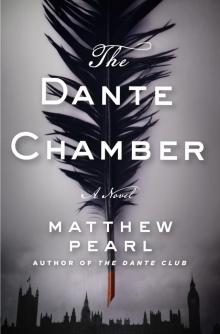 The Dante Chamber
The Dante Chamber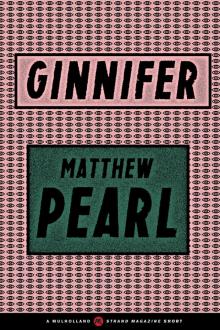 Ginnifer
Ginnifer Company Eight
Company Eight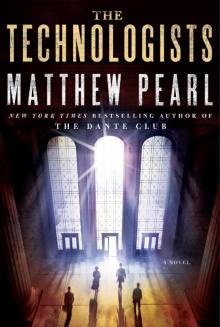 The Technologists
The Technologists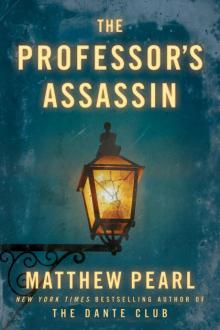 The Professor's Assassin
The Professor's Assassin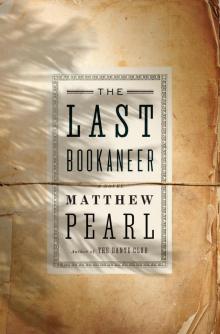 The Last Bookaneer
The Last Bookaneer Company Eight (Kindle Single)
Company Eight (Kindle Single)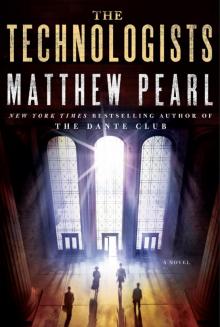 The Technologists: A Novel
The Technologists: A Novel The Last Dickens
The Last Dickens